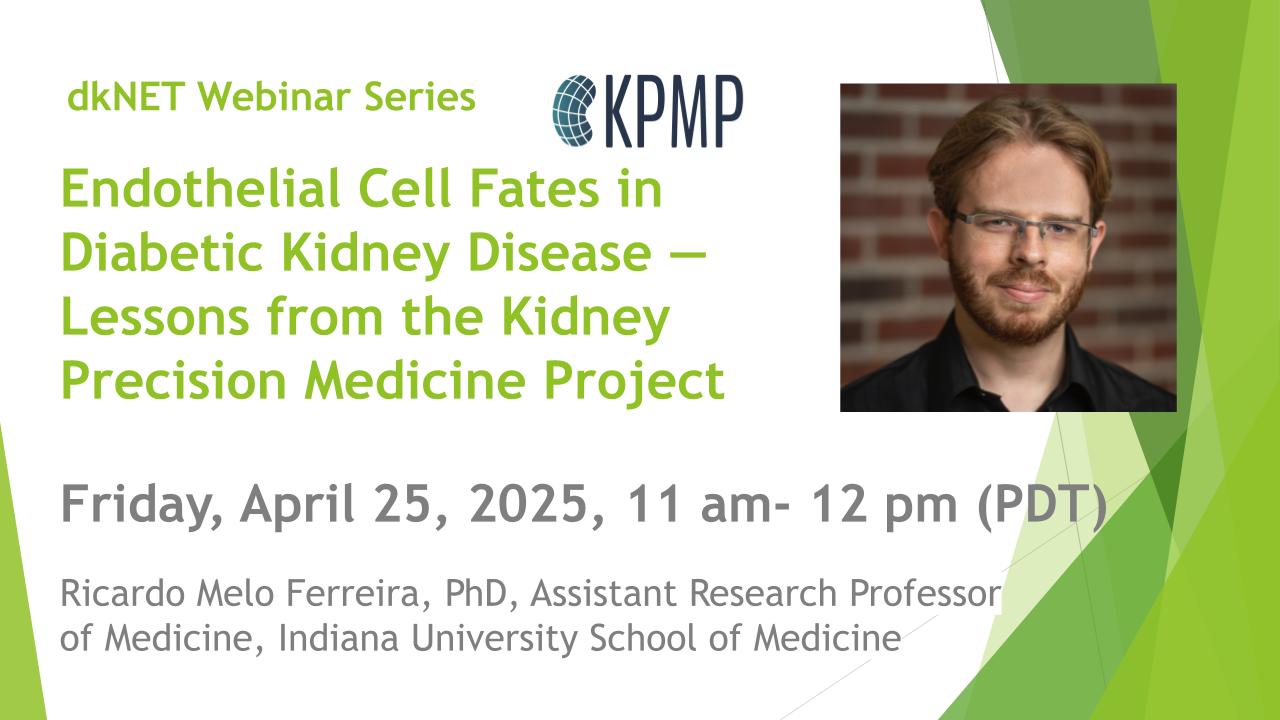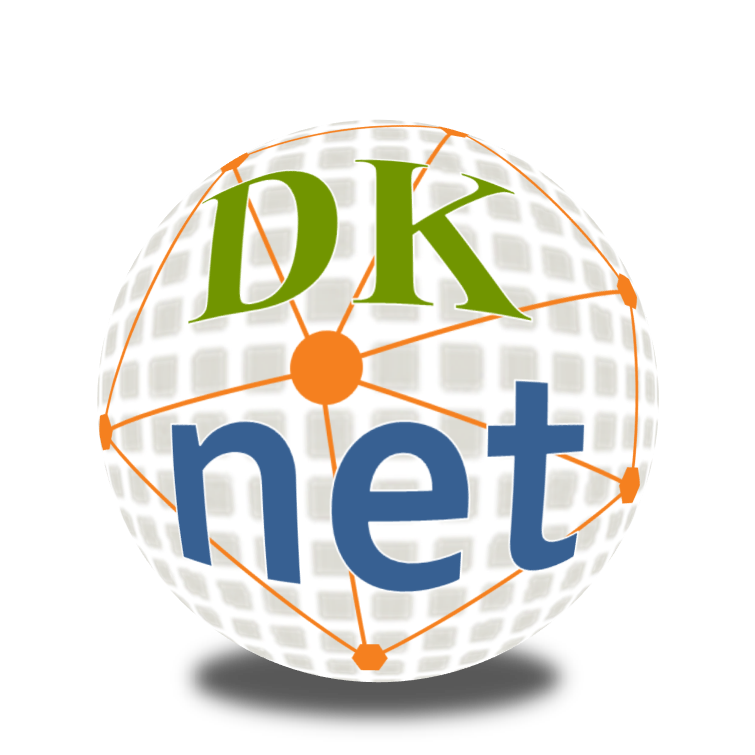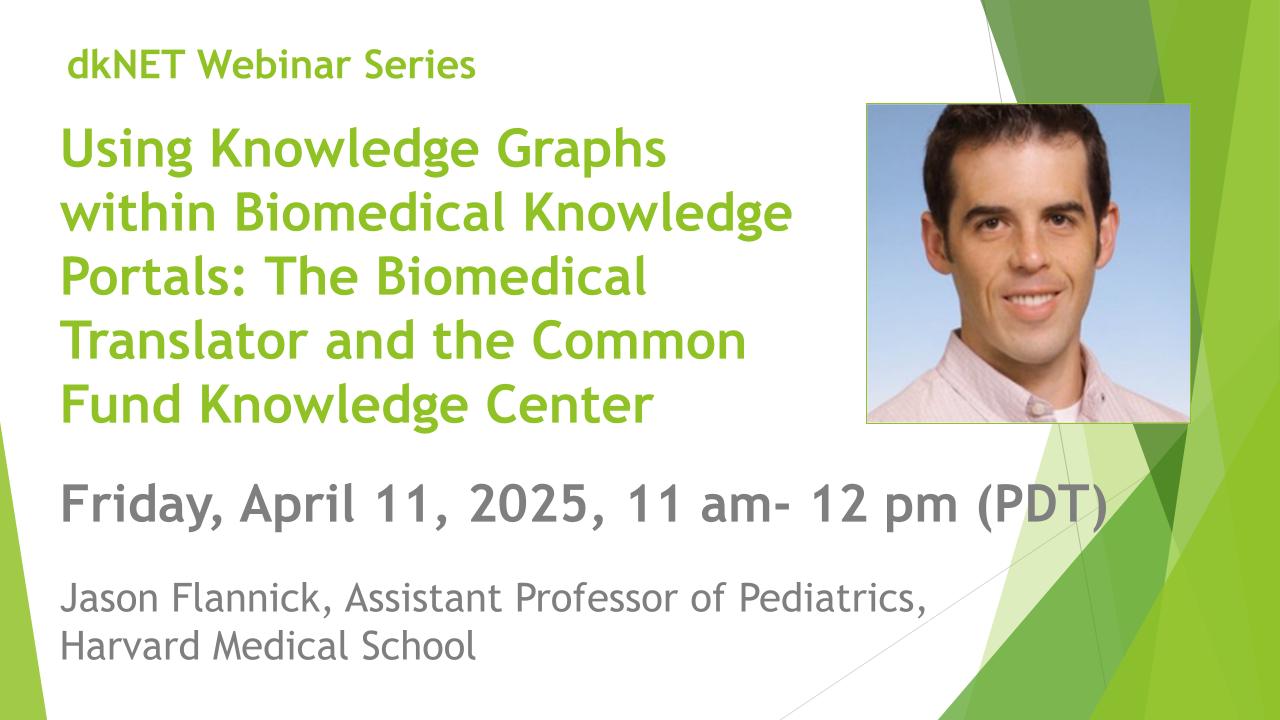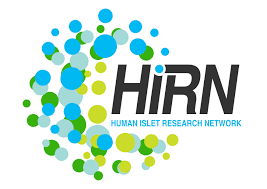Leaving Community
Are you sure you want to leave this community? Leaving the community will revoke any permissions you have been granted in this community.
dkNET community events and announcements in April, 2025
Dear dkNET Community,
dkNET provides updates on activities of interest to the NIDDK-supported community. You could keep up to date on these activities through our Twitter feed @dkNET_info, through our Community Calendar, or through dkNET e-mail list. If you have an event or funding opportunities you'd like to advertise, please contact us info_at_dknet.org.
dkNET News
- Upcoming dkNET Webinars: Join us for dkNET webinars (1) Using knowledge graphs within biomedical knowledge portals: The Biomedical Translator and the Common Fund Knowledge Center, presented by Dr. Jason Flannick, on Friday, April 11, 2025, 11 am - 12 pm PT. (2) Endothelial Cell Fates in Diabetic Kidney Disease—Lessons from the Kidney Precision Medicine Project, presented by Dr. Ricardo Melo Ferreira, on Friday, April 25, 2025. More information: https://dknet.org/about/webinar
- dkNET Summer of Data Student Program: Calling all students in NIDDK relevant disease research fields! Ready to explore data management, FAIR data, rigor and reproducibility, and data sciences? The dkNET Summer of Data program offers training to boost your research skills. Application deadline: April 14, 2025. More information: https://dknet.org/about/Summer-Program
Events in April 2025
Apr. 01, 2025
Catalytic Tool and Technology Development Webinar Series: Kidney Imaging
This webinar will help developers of catalytic kidney imaging tools and technologies improve their tools. It offers a platform for developers to engage with the broader scientific community for feedback and will stimulate collaboration with potential users.
Meeting Objectives
- Discuss the importance of kidney imaging technologies for the kidney research community and their research needs.
- Showcase the development of kidney imaging tools by three investigative teams.
- Facilitate interaction between tool developers and potential users in the kidney community.
More information: https://www.niddk.nih.gov/news/meetings-workshops/2025/r21-catalytic-tool-and-technology-webinar-2025
Apr. 03-04, 2025
2025 NIDDK K Awardees Workshop
The purpose of the workshop is to offer NIDDK career development awardees an in-depth view of the National Institutes of Health (NIH) and NIDDK. The workshop will provide an opportunity to become familiar with the roles of various NIH staff, the types of grant support and resources available, and navigating the NIH grant process. In addition, investigators from the NIDDK research community will share strategies and career advice for achieving success as a research or physician scientist. The workshop form at will encourage networking among participants, and NIDDK program staff will be available for discussion of individual research projects and grant a publications.
Location: Bethesda, MD, USA
More information: https://www.niddk.nih.gov/news/meetings-workshops/2025/k-awardees-2025
Apr. 07-09, 2025
NMRI Annual Workshop 2025
The NMRI is a network that is “owned” by its members and supported by NIDDK. Its success begins with the dedication of senior investigator s to mentor and serve as role models for junior investigators and continues with the participation of active members and the recruitment of new members. More than 600 researchers have participated in NMRI workshops in the past decade, and that number continues to grow. Abstract deadline: March 3, 2025. Registration deadline: March 17, 2025.
Location: Bethesda, MD, USA
More information: https://www.niddk.nih.gov/news/meetings-workshops/2025/nmri-annual-workshop-2025
Apr. 09, 2025
Virtual Diabetes Research Seminar Series: Metabolic Actions of Oxytocin: New Roles for an Ancient Hormone
Speaker: Evan Rosen, MD, PhD, Chief, Division of Endocrinology, Diabetes, and Metabolism Beth Israel Deaconess Medical Center, Professor Harvard University Medical School, Institute Member, Broad Institute of MIT and Harvard University.
More information: https://diabetes-virtual-seminar.org/
Apr. 11, 2025
dkNET Webinar "Using Knowledge Graphs within Biomedical Knowledge Portals: The Biomedical Translator and the Common Fund Knowledge Center"
Join dkNET Webinar on Friday, April 11, 2025, 11 am - 12 pm PT
Presenter: Jason Flannick, Assistant Professor of Pediatrics, Harvard Medical School
Abstract
Knowledge graph s (KGs) have emerged as a powerful framework for integrating and exploring biomedical data. In this webinar I will discuss two resources that aim to integrate biomedical knowledge -- the NCATS Biomedical Translator (https://ui.transltr.io) and the Common Fund Data Ecosystem Knowledge Center (CFDE KC; cfdeknowledge.org) -- as case studies in the challenges and opportunities associated with using KGs to guide basic and translational discovery. I will begin by outlining the vision behind Translator, including the establishment of KG standards and semantic precision. I will provide practical examples of Translator use cases, drawing explicit comparisons with alternative approaches like large language models (LLMs) to highlight the strengths and weaknesses of each approach. I will then introduce the CFDE KC, which addresses similar challenges through a different complementary strategy. I will review the use of KGs within the CFDE KC and contrast them with other access mechanisms of data within the CFDE. I will conclude by synthesizing broader lessons learned from these two experiences, offering insights into the nuanced role KGs should play in future biomedical resource development. Ultimately, I suggest strategies for combining the strengths of KGs, LLMs, and statistical data integration to maximize translational impact and user adoption in biomedical research.
The top key questions that these resources can answer:
NCATS Biomedical Translator (https://ui.transltr.io)
1. What drugs may treat conditions related to type 2 diabetes? What chemicals may decrease the activity of SLC3 0A8?
Common Fund Data Ecosystem Knowledge Center (CFDE KC) (cfdeknowledge.org)
1. What exercise-related molecular mechanisms may underlie type 2 diabetes
2. What variants are observed from sequencing pediatric patients in the Kids First project, and what are the phenotypes of patients in which they are observed?
Dial-in Information: https://uchealth.zoom.us/meeting/register/R1NDDLmAR62qkPqOVhd7vg
More information: https://dknet.org/about/blog/2827
Apr. 24, 2025
NIDDK Central Repository Webinar Series "Artificial Intelligence Fundamentals Applications"
This session builds upon the prior Artificial Intelligence fundamentals session and covers applications used in real world settings, including:
- Statistics versus Machine Learning
- Model Metri cs
- Classification Model Metrics – Accuracy, Precision, and Recall
- Regression Model Metrics – MAE, MSE, RMSE, and R-squared
- Neural Networks and Their Applications
- Feedforward Neural Networks
- Increasing Complexity
- Convolutional Neural Networks (CNN)
- Recurrent Neural Network (RNN)
- Transformer Learning
- Generative Adversarial Networks (GAN)
This session will feature presentations by experts in data science at the Naval Information Warfare Systems Command (NAVWAR) 4.0 Data Science Learning Prog ram.
More information: https://repository.niddk.nih.gov/pages/webinars
Apr. 25, 2025
dkNET Webinar: Endothelial Cell Fates in Diabetic Kidney Disease—Lessions from the Kidney Precision Medicine Project
Join dkNET Webinar on Friday, April 25, 2025, 11 am - 12 pm PT
Presenter: Ricardo Melo Ferreira, PhD, Assistant Research Pr ofessor of Medicine, Indiana University School of Medicine
Abstract
The Kidney Precision Medicine Project (https://www.kpmp.org/) obtains altruistically donated biopsies of kidney patients with the purpose of understanding and finding new ways to treat chronic kidney disease (CKD) and acute kidney injury (AKI). A plethora of orthogonal molecular interrogation technique s are used with to uncover mechanisms underlying kidney disease. In this work we sought to understand the spatially-anchored regulation and transition of endothelial and mesangial cells from health to injury in DKD. From 74 human kidney samples, an integrated multi-omics approach was leveraged to identify cellular niches, cell-cell communication, cell injury trajectories, and regulatory transcription factor (TF) networks in glomerular capillary endothelial (EC-GC) and mesangial cells. We identified a cellular niche in diabetic glomeruli enriched in a proliferative endothelial cell subtype (prEC) and altered vascular smooth muscle cells (VSMCs). Cellular communication within this niche maintained pro-angiogenic signaling with loss of anti-angiogenic factors. We identified a TF network of MEF2C, MEF2A, and TRP S1 which regulated SEMA6A and PLXNA2, a receptor-ligand pair opposing angiogenesis. In silico knockout of the TF network accelerated the transition from healthy EC-GCs toward a degenerative (injury) endothelial phenotype, with concomitant disruption of EC-GC and prEC expression patterns. Glomeruli enriched in the prEC niche had histologic evidence of neovascularization. MEF2C activity was increased in diabetic glomeruli with nodular mesangial sclerosis. The gene regulatory network (GRN) of MEF2C was dysregulated in EC -GCs of patients with DKD, but sodium glucose transporter-2 inhibitor (SGL T2i) treatment reversed the MEF2C GRN effects of DKD. The MEF2C, MEF2A, and TRPS1 TF network carefully balances the fate of the EC-GC in DKD. When the TF network is “on” or over-expressed in DKD, EC-GCs may progress to a prEC state, while TF suppression leads to cell death. SGLT2i therapy may re store the balance of MEF2C activity.
The top 3 key questions that the KPMP resource can answer:
1. How the expression of a gene of interest changes across cell types and conditions?
2. How are genes, proteins and metabolites spatially distributed in different samples?
3. Which datasets I can download and use to complement my research?
Dial-in Information: https://uchealth.zoom.us/meeting /register/DxDgWA4LT_a45dHmRfSIhw
More information: https://dknet.org/ab out/webinar
Funding Opportunities Information and Deadlines in April 2025
Apr. 14, 2025
dkNET Summer of Data Student Program Application Due Date
The Summer of Data program provides students the opportunity to learn data management, FAIR data, rigor and reproducibility, and data science skills while performing their research. It is a 7-week virtual summer program where students engage in weekly sessions with dkNET staff and associates to learn about how to use dkNET and other tools to support their research, while engaging in research projects within their labs. A $500 stipend is provided. Application Due Date: April 14, 2025.
More information: https://dknet.org/about/S ummer-Program
Apr. 30, 2025
Helmsley Funding Opportunity Concept Notes Due: T1D Innate Immunity Projects
The Helmsley T1D Program seeks to support studies that aim to evaluate or modulate the function of innate immune cells and pathways in T1D, with an emphasis on human disease during relatively early stages of disease (i.e., autoantibody positivity through early onset of clinical disease).
Of specific interest are research plans that include:
Analyzing the type and function of innate cells (e.g. macrophages, dendritic cells, natural killer cells) present in the pancreas and their interactions with other cells, tissue-resident or otherwise;
- Investigating mechanisms of T1D pathogenesis that involves innate immunity;
- Identifying or validating biomarkers of disease progression or response to treatment based on innate immune cells;
- Identifying or validating therapeutic innate immune cell targets; and
- Developing or validating preclinical or clinical therapies to prevent or delay T1D that target or use innate immune cell pathways.
Proposed activities can include, but are not limited to:
- Generation or testing of hypotheses using human samples;
- Profiling or functional analysis of innate immune cells in pancreas samples and pancreas slices;
- Analysis of preexisting relevant data sets, either publicly available or generated by the applicant; and
- Preclinical or clinical activities that advance or build evidence for a specific therapeutic concept based on existing know ledge of the role of innate immunity in T1D.
Like other fields, scientific research in T1D has been challenged by limited access to human samples. To facilitate potentially impactful studies, Helmsley has partnered with two leading T1D networks, the Network for Pancreatic Organ donors with Diabetes (nPOD) and INNODIA, to enable access to disease relevant samples and connected clinical and biological data in relation to this RFP. Applicants who proceed to the full proposal stage with a project that includes access to nPOD or INNODIA samples will work with the relevant network team to hone final research plans and access to samples.
Concept Notes Due Date: April 30, 2025. Full Proposal Due Date: July 30, 2025.
More information: https://helmsleytrust.org/request_for_proposal/innate-immunity-t1d-rfp/





